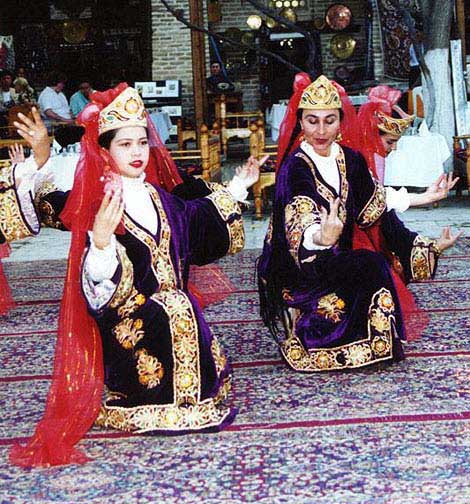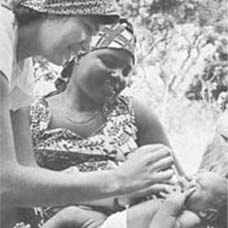
“Take great care,” warned the Peace Corps Safety and Security officer when she gave me permission to make a three-day sales trip to Tashkent in Uzbekistan
Life in Kazakhstan: In the Land of Timur the Great, Glendinning goes on TV, is stopped by police
Publish Date: December 9, 2004 | Permanent Link
By Jim Glendinning
You can tell a lot about a country’s confidence if you look at the ease of entry for foreign tourists and how it manages its currency exchange.
Uzbekistan is a case in point. A one-week tourist visa takes some days to obtain, requires a photograph and application form and costs a whopping $100. The local currency (sum) can only be obtained at the Bank of Uzbekistan, requiring a long wait, and the currency comes in six-inch bundles of low denomination notes.
Uzbekistan borders Kazakhstan to the south, is only 40 miles from where I work and offers a good contrast to Kazakhstan. It has 50 percent more people – or a population of 26 million – but has only 16 percent of the land area of Kazakhstan. Its people, on average, make only one third as much in income as the Kazakh, but consider themselves more sophisticated. They are the heirs to Central Asia’s most significant cultural monuments: the architectural legacy of Timur the Great who brutally conquered half the known world and is appreciated today as a patron of the arts. He died in 1405. I decided to visit.
Like Kazakhstan, Uzbekistan has a strong president, a former Communist leader, who has failed to significantly improve the country’s economy since independence and to satisfy the bulk of the population. Uzbekistan also shares a border with Afghanistan. The country has had some recent bombings and has banned the Islamic Renaissance Party.
"Take great care," warned the Peace Corps Safety and Security officer when she gave me permission to make a three-day sales trip to Tashkent.
Arriving in Tashkent, which, with a population of 2.4 million, is Central Asia’s largest city, I took the metro (16 cents). It was spotlessly clean and ornately designed in a heavy, Soviet manner. The trains arrived every six minutes. The well-dressed passengers were mainly young, and all were dark-haired; many wore black leather jackets. I saw no one near my age. I expect the fare was too expensive for pensioners.
With different coloring, clothing and my small pack, I stood out, but no one showed any interest, except to offer me a seat. Emerging at the Kosmonavtar metro station, which was decorated with portraits of Soviet astronauts, I found wide, tree-lined boulevards full of traffic, with massive government buildings on each side, most of them bearing slogans by President Karimov, linking himself to Timur the Great.
At the Ali-Tour guest house, the cheerful owner Ali bounded out to greet me.
"Meester Jim," he beamed at me, "You are most welcome." I had sent him an e-mail, and he was expecting me. It appeared I had come at the right moment.
A TV crew was due any minute to film the hotel, and I was the only guest. Ali led me past the empty pool, under trailing vines and up some stairs to the hotel suite – mine for free, including 289 TV channels, if I would appear in front of the cameras.
The TV crew came and went. I was interviewed, with Ali’s teenage son Anvar translating. Various neighbors dropped by to watch the excitement: the Bulgarian ambassador, an aging Uzbek male film star unable to get work, a friend who had worked in Florida selling automobiles and a quiet man with a pencil-thin mustache whom Ali said was from Uzbekistan’s KGB. I certainly had come at a good time to add a foreign element to the TV program. Tourists were in short supply. I saw only two other tourists during four days in Tashkent. It was out-of-season, and Americans have been frightened off by recent bombings.
Due to the bombings, the police were in evidence almost everywhere – at street corners, guarding government buildings, patrolling the metro stations. I was coming out of the metro at Chorsu Bazaar, the city’s largest, when two young, green-uniformed police officers stopped me, saluted and asked for my papers. I started to pull out my passport, but they beckoned to me to come to a small office at the subway exit.
"Have you narcotics, guns?" they asked. I shook my head and said, "Nyet." They wanted to see everything in my small backpack and the contents of my pockets. They were polite, but direct, pointing to a large poster of 60 or so wanted terrorists as explanation. None looked like me, but I wasn’t arguing. They helped me repack, said, "I am sorry" in English and let me go.
The next day, Anvar offered to be my guide. First, he took me to the Tashkent College of Tourism where he studied. I met his best friend who also studied there and cooked at the Sheraton Tashkent to pay his fees. We then visited three tour operators (this was a business trip, after all), checked in at the Peace Corps office to report my presence and visited two museums, including the superb Museum of Applied Art, which houses contemporary work of the highest quality. We had tea and cakes, talked our way out of a problem with the police when I was taking photos in the metro and altogether had a productive day. In the evening, I went to the ballet ($2.20).
Next, I moved to a bed and breakfast ($15 a night) near the bazaar. A brand-new, brick building, it was owned by an engineer and his charming wife, Gulnara, who was the hostess. Almost predictably, their eldest son lived in the United States. Despite relative affluence (to my eyes), they complained about the economy. For example, teachers earned only $40 a month. If the middle class was complaining, I thought, what about the working poor and pensioners?
As in Kazakhstan, everyone complained about the Mafia and corruption. To Uzbeks, independence after 70 years of Soviet rule has not resulted in the anticipated economic benefits.
The police are everywhere, but persistent corruption remains. Despite visa hassles and an inept national tourism bureau, tourism to Uzbekistan is greater than its neighbors. The fabled "Silk Road" runs right through the country and includes Central Asia’s holiest city, Bukhara, and the most evocative destination of all, Samarkand, which contains Timur’s mausoleum.
With a smattering of Russian, some research in advance and some tips from recent travelers, this could make a rewarding trip at the right season, late spring or fall. Which is what I plan to do.
Jim Glendinning is a former tourist guide in Alpine. He joined the Peace Corps earlier this year.








